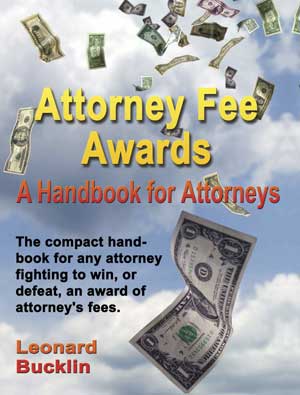
Attorney Fee Awards: A Handbook for Attorneys
Sample Text -- Be alert to client's tax expectations when an attorney fee is awarded
The following text excerpt from Attorney Fee Awards: a handbook illustrates what is contained in this litigator's reference for recovering, or defeating, an award for attorney fees. Law, practical advice, and proven forms. Concise, frank and practical: the sort of advice you would get from a senior litigator being in your office and being your mentor.
Be alert to tax problems when attorney fee is awarded.
It is common for parties to settle a case after a verdict. Clients of the prevailing party normally will assume the award of attorney's fees goes to the attorney and hence the attorney fee is not income to be reported to, or taxed by, the IRS. Clients may make the same assumption if the settlement agreement provides for payment of an attorney fee directly to the attorneys --- clients think the attorney fee paid directly to the attorney is not income to the client. The clients' assumptions are wrong. To prevent later claims of legal malpractice in the attorney's advice regarding settlement, the attorneys for the prevailing party should keep in mind that the client's normal expectation may be wrong.
The Internal Revenue Department takes the position that the award of the attorney fee is owned by the party, not her attorney, and taxes the full award received by the party, including the attorney fee, even if the fee is paid directly to the attorney. In cases where attorney fees exceed the damage awards -- such as in public interest litigation where relief is injunctive or awards are minimal -- a client could be forced to pay more in taxes than he or she won in the award.
In the case of a litigation recovery the income-generating asset is the cause of action derived from the plaintiff's legal injury. The plaintiff retains dominion over this asset throughout the litigation. . . . When a litigant's recovery constitutes income, the litigant's income includes the portion of the recovery paid to the attorney as a contingent fee.
Commissioner of Internal Revenue v. Banks, 125 S.Ct. 826, 543 U.S. 426, 160 L.Ed.2d 859 (U.S. 01/24/2005).¹
(After the client has paid the IRS, then the IRS gets a second bite of the apple by taxing the income received by the attorney!)
Plaintiffs in lawsuits alleging employment discrimination and other civil rights claims fare better on their taxes—if they recovered their awards after the American Jobs Creation Act became law in October 2004. A provision in the Jobs Creation Act² relieves plaintiffs who settle or win court awards under a broad array of federal and state civil rights statutes from having to pay taxes on the attorney fee portions of their awards. Before the American Jobs Creation Act, a prevailing plaintiff would have had to pay taxes on the entire award amount. For some taxpayers a deduction is available for the expense of recovering the income. For others the operation of the Alternative Minimum Tax10 comes into play and does not allow any miscellaneous itemized deductions.
Notice the Jobs Creation Act relief statute applies only to prevailing plaintiffs, not to prevailing defendants. Furthermore, it does not address awards of attorney fees outside the specified federal and state civil right statutes.
What all this boils down to is that trial counsel should probably disclaim professional ability to advise the client on tax consequences, tell the client the attorney fee may be taxable to the client, and tell the client to see tax counsel for advice before a settlement, if taxes are a concern to the client.
The above excerpt is protected by copyrights. It is presented here to help you decide on your purchase of a handbook on attorney's fees. The footnotes included in the book's text have been deleted for this Internet view of sample pages.
Attorney Fee Awards: a handbook is the basic reference for recovering, or defeating, an award for attorney fees. Law, practical advice, and proven forms. Concise, frank and practical: the sort of advice you would get from a senior litigator being in your office and being your mentor.

Our "100% money back, No Questions Asked, Guarantee."
If you don't totally agree that the book with all its forms is worth every penny, simply tell us within 60 days to refund your money. You keep our book; we refund your money. What could be better!

